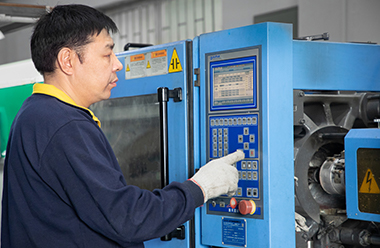Plastic injection molding has been a popular and efficient manufacturing process for many decades, enabling the production of various products in various industries. This article explores the future of plastic injection molding, including emerging trends and innovations in technology, materials, and processes. The discussion covers multiple aspects of the industry, including the impact of the COVID-19 pandemic, sustainability, automation, and the role of China plastic injection mold manufacturers.

Introduction:
Plastic injection molding is a manufacturing process that involves injecting molten plastic material into a mold cavity to produce a product. The process is widely used in various industries, including automotive, aerospace, medical, and consumer goods. Plastic injection molding is popular due to its efficiency, speed, and versatility, enabling the production of complex shapes and high volumes of products.
Plastic injection molding has seen significant innovations and advancements in technology, materials, and processes in recent years. These developments have enabled the industry to overcome various challenges, such as reducing waste, improving sustainability, enhancing product quality and consistency, and increasing automation and efficiency.
This article explores the future of plastic injection molding by discussing emerging trends and innovations in the industry. The discussion will cover various aspects of the industry, including the impact of the COVID-19 pandemic, sustainability, automation, and the role of China plastic injection mold manufacturers.
Impact of the COVID-19 Pandemic:
The COVID-19 pandemic has significantly impacted the global economy, including the plastic injection molding industry. The pandemic has disrupted supply chains, causing raw materials, components, and equipment shortages. It has also led to a decline in product demand, particularly in the automotive and aerospace industries, which are significant consumers of plastic injection molded parts.
However, the pandemic has also highlighted the industry’s importance of resilience and adaptability. Many plastic injection molding companies have pivoted their production to meet the demand for critical medical supplies, such as face shields, ventilator parts, and testing kits. This demonstrates the industry’s flexibility in responding to changing market needs and priorities.
Sustainability:
Sustainability has become a critical issue in the plastic injection molding industry, with increasing pressure from consumers, regulators, and stakeholders to reduce waste and adopt more environmentally friendly practices. The industry has responded by developing new materials, processes, and technologies that aim to reduce the environmental impact of plastic injection molding.
One of the most significant trends in sustainable plastic injection molding is using recycled materials. Recycled plastics can be used to manufacture new products, reducing the need for virgin materials and diverting waste from landfills. Some plastic injection molding companies have also adopted closed-loop systems, where waste materials are recycled and reused in the same production cycle.
Another sustainable trend is bioplastics, which are derived from renewable sources, such as corn starch, sugarcane, and vegetable oils. Bioplastics have a lower carbon footprint than traditional plastics, as they are biodegradable or compostable, reducing plastic waste in the environment.
Automation:
Automation has been a significant driver of innovation in the plastic injection molding industry, enabling greater efficiency, precision, and flexibility in manufacturing. Automation technologies include robotics, artificial intelligence, and machine learning, which can perform various tasks, such as material handling, quality control, and mold changing.
Robotic systems can perform repetitive tasks, such as loading and unloading parts, with high speed and accuracy, reducing labor costs and improving productivity. Artificial intelligence and machine learning can optimize manufacturing by analyzing data and predicting defects or quality issues, enabling real-time adjustments and reducing waste.
China Plastic Injection Mold Manufacturers:
China has been a dominant player in the plastic injection molding industry, with many plastic injection mold manufacturers offering a wide range of products and services. China’s plastic injection molding industry has grown significantly in recent years, driven by its large domestic market and increasing demand from international customers.
China plastic injection mold manufacturers have invested in research and development to enhance their capabilities and competitiveness. They have been adopting advanced technologies, such as automation and robotics, to improve efficiency and quality and developing new materials and processes to meet evolving customer needs.
Custom Plastic Molding:
Custom plastic molding is a growing trend in the plastic injection molding industry, with increasing demand for specialized products that meet specific customer requirements. Custom plastic molding involves designing and producing unique parts tailored to a customer’s needs, such as shape, size, and material.
The custom plastic molding requires specialized expertise and equipment and a high degree of collaboration between the customer and the plastic injection molding company. The process involves various stages, including design, prototyping, tooling, and production, and requires a deep understanding of the customer’s needs and expectations.
Emerging Innovations:
The future of plastic injection molding looks promising, with several emerging innovations expected to transform the industry. These innovations include:
3D Printing: 3D printing technology is gaining popularity in the plastic injection molding industry, enabling the production of complex geometries and low-volume parts with high accuracy and precision. 3D printing can reduce lead times, costs, and waste and help customization and manufacturing flexibility.
Multi-material Molding: Multi-material molding is a process that involves molding different materials in the same product, enabling the production of parts with unique properties and characteristics. Multi-material molding can improve product performance, reduce assembly costs, and enhance design flexibility and creativity.
Smart Manufacturing: Smart manufacturing involves the use of sensors, data analytics, and artificial intelligence to optimize the manufacturing process, improve quality and efficiency, and reduce waste and downtime. Smart manufacturing can enable real-time monitoring and control of the production process, as well as predictive maintenance and optimization.
Conclusion:
The future of plastic injection molding looks bright, with emerging trends and innovations transforming the industry. The industry adapts to changing market needs and priorities, such as sustainability, customization, and automation. It invests in new technologies, materials, and processes to enhance its capabilities and competitiveness.
China plastic injection mold manufacturers play an increasingly important role in the industry, offering a wide range of products and services and investing in research and development to improve their competitiveness. Custom plastic molding is a growing trend driven by the demand for specialized products that meet specific customer needs.
The plastic injection molding industry is poised to benefit from emerging innovations, such as 3D printing, multi-material molding, and intelligent manufacturing, which are expected to enhance product quality, reduce costs and waste, and enable customization and flexibility in manufacturing. As the industry continues to evolve and innovate, it will remain a critical component of the global manufacturing ecosystem.
